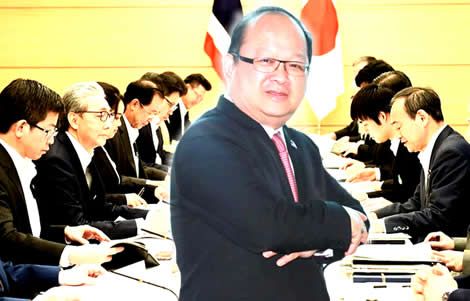Vice president of the Federation of Thai Industries says Thailand should join the 11 member CPTPP pact and bolster its trade access as a priority as the kingdom’s export-led economy faces a long and difficult recovery from the devastating Covid 19 virus.
A Thai business leader has called for the kingdom to join an alternative Pacific trade agreement to realign and improve its trade policy in order to boost exports and make the kingdom more attractive to investors. It comes as he predicts Thailand faces an uphill economic struggle because of the nature of this economic disaster that will take some time to recover from.

A key Thai industry leader is calling for the government to begin work now to reposition Thailand’s trade connections to help the kingdom compete in a new era which will emerge after the Covid 19 virus catastrophe.
Kriangkrai Thiannukul is the Vice President of the Federation of Thai Industries which has been monitoring the country’s export-led economic base since the start of this year as the impact of the coronavirus related crisis has deepened.
Industry boss favours Thailand joining 11 member CPTPP trade pact that excludes China and the US
Among his specific recommendations is that Thailand should move to join the CPTPP or Comprehensive and Progressive Agreement for Trans-Pacific Partnership which is a trade alliance including 11 countries on the rim of the Pacific including Australia, New Zealand, Japan, Malaysia, Mexico, Chile, Brunei, Canada, Peru, Singapore and Vietnam.
Tourism and exports are 82% of the Thai economy
Mr Kriangkrai points out that 70% of Thailand’s economy is made up of exports and with 12% of GDP coming from tourism, this means that over 82% of the kingdom’s economic output is highly dependent on the state of the world economy at any given point.
The current collapse of markets and even global freight demand, as well as scaled-back international air travel, spells a severe depression in economic activity for the kingdom.
Wave of firms moving out of China
He draws particular attention to the wave factory relocations from Thailand’s northern neighbour with countries now pulling their manufacturing from China including Japan which is relocating to ASEAN bases in addition to the United States which is moving back to North America as well as European countries and firms who have begun to look at reviving manufacturing activity on that continent.
Thailand has been promoting the RCEP trade pact increasingly seen as a vehicle for China’s influence
Thailand has been promoting the RCEP or Regional Comprehensive Economic Partnership which is increasingly seen as a Chinese trade vehicle.
In a major blow to that pact, India pulled out last November at a summit held in Bangkok.
It is also increasingly reported that Japan has become lukewarm about the trade pact although officials in Tokyo deny that this is the case.
Mr Kriangkrai of the industry federation did not address the alternative last week but urged the Thai government to join the rival trade grouping which neither includes China or the United States at this point.
Trade pact is being debated in Thailand even as the Ministry of Commerce pushes it with cabinet
The Thai industry leader did acknowledge the reticence, so far, of the government to commit itself to this course.
Senior Thai officials have long pointed to concerns which the government has relating to the pact’s possible effects on the Thai agriculture sector with its proposed unbridled access to the kingdom’s domestic market and other issues.
Nevertheless, the Thai Commerce Ministry has moved to open up negotiations for the kingdom to join the pact.
It accepts that it offers an opportunity to boost Thai exports and offers the opportunity to rebalance the country’s dependence on its two largest markets namely the United States and China.
Opposition MPs also have expressed concerns
Nevertheless, there is some opposition to the pact from the Thai opposition benches including some Pheu Thai MPs who advocate that Thailand pursues a bilateral approach to trade similar to the current policy being adopted by the United States under President Donald Trump.
Japan urges Thailand to also join the CPTPP
In February this year, following a visit by Japanese government special adviser Kiyama Shigeru to Bangkok where he met Deputy Prime Minister Somkid Jatusripitak, Mr Shigeru emphasised that the Japanese government supported Thailand joining the alternative trade pact which it is also a party to.
Thailand’s trade and investment competitors have stronger market access to world markets
Mr Kriamngkrai on Wednesday underlined his concern that Thailand’s key competitors for investment such as Vietnam, Malaysia and Indonesia were better positioned in terms of trade links and preferences to accommodate investors in the changed world emerging from the post-Covid 19 era.
It would be true to say that this will be a world supply chain that is less global and certainly less focused on China.
An EU free trade agreement with Vietnam is currently in place while it also enjoys preferred access to the US market and is a member of the CPTPP.
Thailand faces an uphill economic struggle
Mr Kriangkrai expressed his fears that Thailand’s industrial base faces a long and uphill battle to recover from the disastrous consequences of this catastrophe.
He concluded that out of 45 trade sectors, 13 would indeed benefit from the virus emergency.
These include Thailand’s food exports and the country’s capacity for the development and production of air conditioning equipment.
However, over 66% of Thai industry is looking at something more than a U shaped recession which is the best outcome that some experts are now predicting.
Thailand’s industrial base faces decimation even greater than its tourism sector due to a variety of factors predating the Covid 19 crisis or even the US-China trade war.
Origin of crisis not financial, it will take longer to recover as the damage is deep and widespread
Many economic experts point out that this world economic crisis, unlike ones in recent history, is not a financial one but one that has started at the very basis of world trade, domestic markets, business and employment.
Even before the virus closed down large swathes of the economy in Europe and the United States, it had done so in China creating huge losses in economic activity much of which simply can never be recovered
The extension of the lockdown now means that the economic damage is also becoming increasingly permanent.
Experts believe that the longer that areas of the world economy are locked down, the greater the damage and the longer it will take to recover in terms of lost concerns, financial liquidity and of course, confidence.
These shutdowns are unprecedented.
This could be the difference between a U shaped recession and recovery over one to two years or something far grimmer, a depression which may still be exacerbated by financial shocks which have yet to be revealed but that are building up right now in the financial system as companies worldwide begin to file for bankruptcy.
United States is now Thailand’s largest customer
The industry leader did not state it directly but it did appear that he was advocating more of a focus on Thailand’s trade relationship with Japan and non-aligned countries as well as the United States in the future.
He noted that the United States has now become Thailand’s biggest customer.
He also suggested that Thailand could be well-positioned to accommodate Chinese firms or investment into the kingdom with more open access to world markets.
New US-China cold war has begun
We are clearly now in a world divided between the United States on one side and China on the other.
This week, the heightened tensions and rhetoric between the two powers over the coronavirus crisis led to speculation that if President Trump wins the US election in November, a new cold war between these powers is inevitable and indeed that it has already begun.
PM met US Ambassador in April and talked about a more ‘proactive’ trade relationship with the US
In April, Thailand’s Prime Minister Prayut Chan ocha met US Ambassador Michael DeSombre at Government House and the two leaders talked about forging a new more ‘proactive’ trade agreement to assist Thailand’s economic recovery after the virus emergency.
Pessimism about Thailand’s immediate prospects
However, Mr Kriangkrai, while advocating that Thailand move now to join the CPTPP and expand its trade network, was still less than optimistic about the kingdom’s short term economic prospects.
‘After the outbreak, global economies, including that of Thailand, will recover slowly as businesses will not be able to run at full capacity. Things will not return to normal until a vaccine is available and that will take about 12 to 18 months, plus the time required to distribute the vaccine globally,’ the industry boss said.
He also highlighted the growing tensions between the US and China and pointed to the extensive damage done to Thailand’s export economy even before the coronavirus outbreak caused by the US-China trade war.
Further reading:
Thai workers left facing mass unemployment as Chiang Mai hotel staff protest ฿10m wage arrears
Risk must be taken to open up Thailand and its tourism industry without delay says richest man
Government begins looking at borrowing options to fund huge ฿1.9 trillion economy rescue package
Thailand and US aim for a new more ‘proactive’ trading relationship as ambassador meets Prayuth
No limit on borrowing as Somkid plots the biggest stimulus package yet to address the virus crisis


















